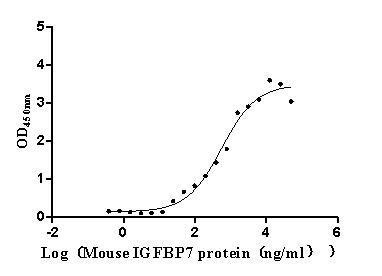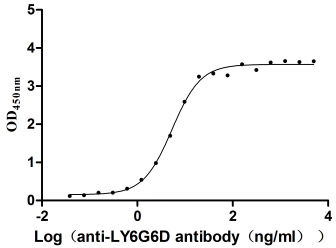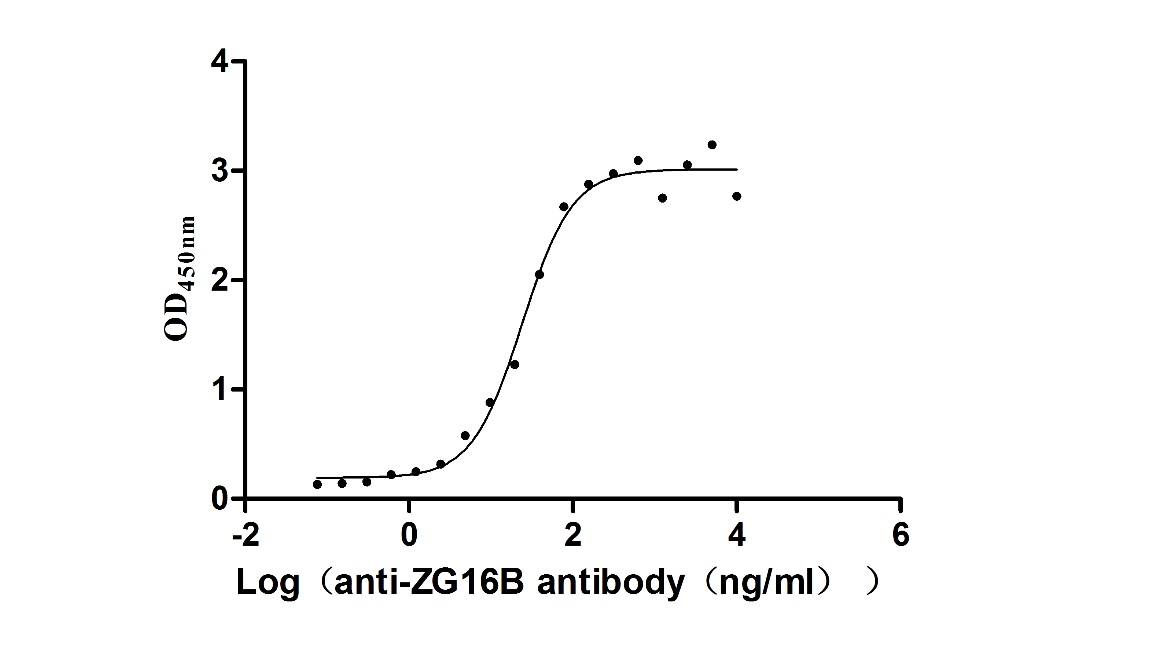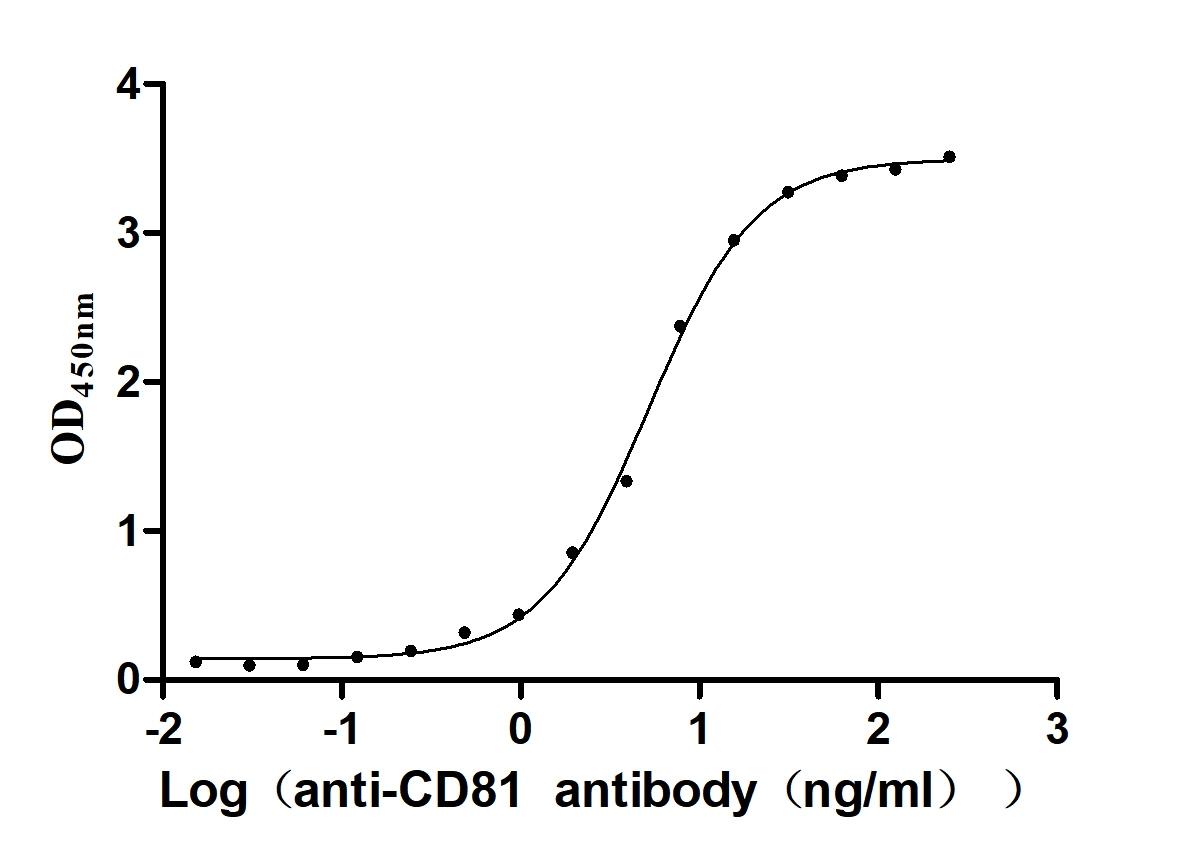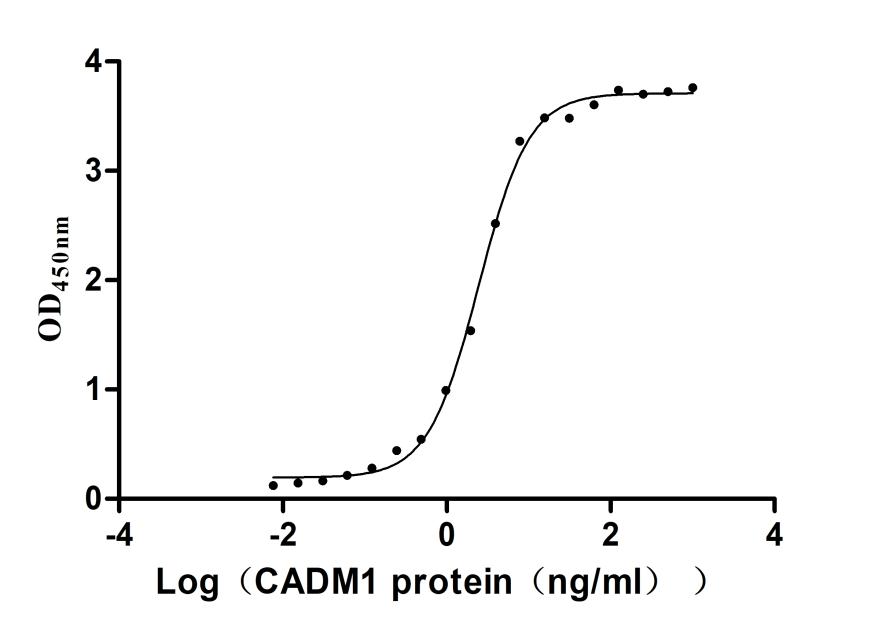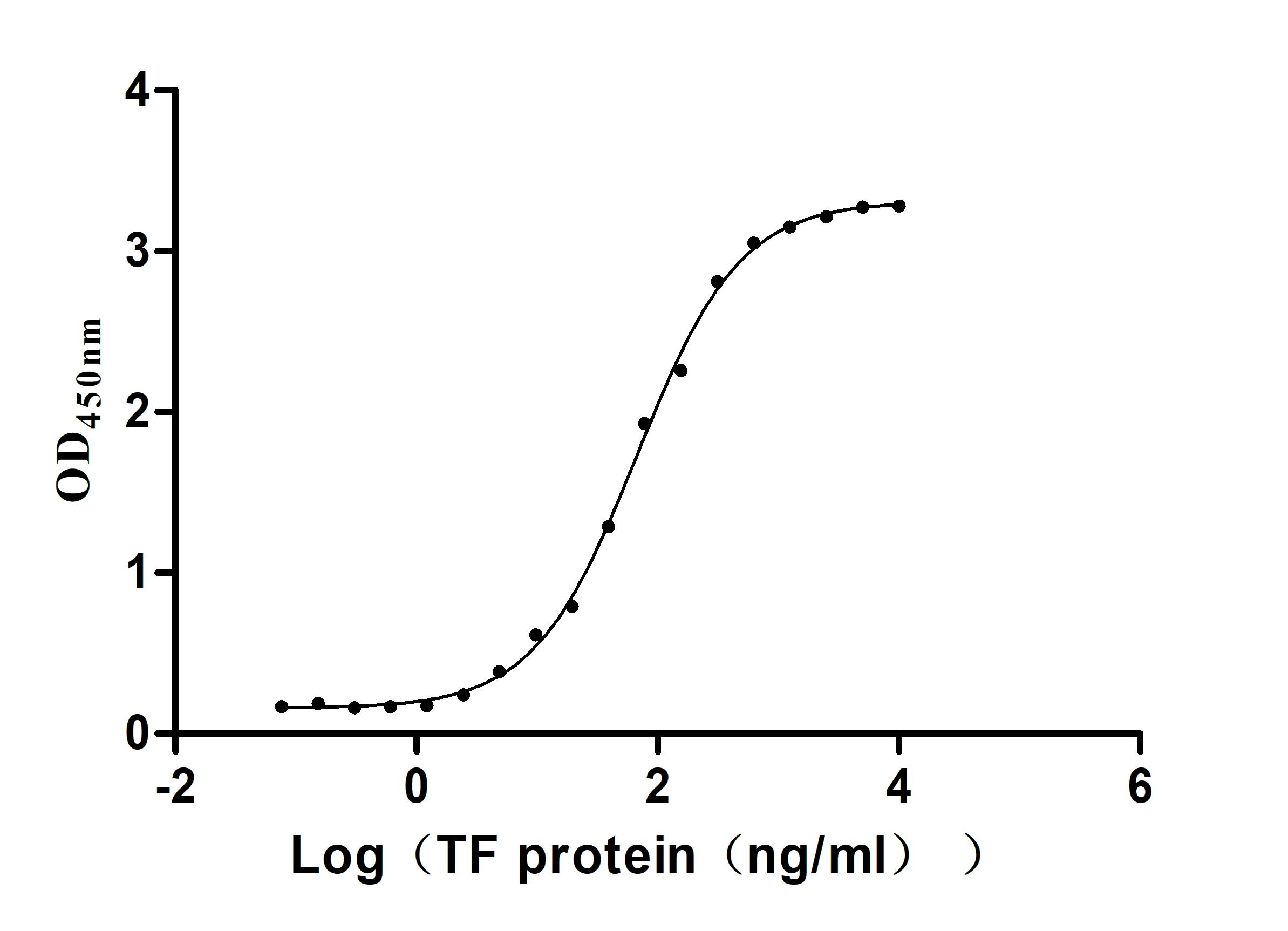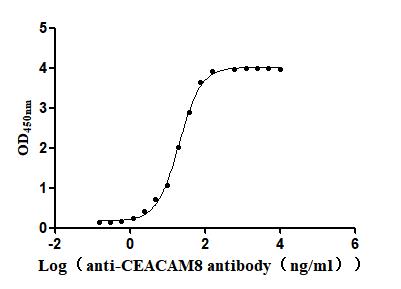Recombinant Mouse Adenosine receptor A2b (Adora2b), partial
-
货号:CSB-YP733694MO1
-
规格:
-
来源:Yeast
-
其他:
-
货号:CSB-EP733694MO1
-
规格:
-
来源:E.coli
-
其他:
-
货号:CSB-EP733694MO1-B
-
规格:
-
来源:E.coli
-
共轭:Avi-tag Biotinylated
E. coli biotin ligase (BirA) is highly specific in covalently attaching biotin to the 15 amino acid AviTag peptide. This recombinant protein was biotinylated in vivo by AviTag-BirA technology, which method is BriA catalyzes amide linkage between the biotin and the specific lysine of the AviTag.
-
其他:
-
货号:CSB-BP733694MO1
-
规格:
-
来源:Baculovirus
-
其他:
-
货号:CSB-MP733694MO1
-
规格:
-
来源:Mammalian cell
-
其他:
产品详情
-
纯度:>85% (SDS-PAGE)
-
基因名:
-
Uniprot No.:
-
别名:Adora2b; Adenosine receptor A2b
-
种属:Mus musculus (Mouse)
-
蛋白长度:Partial
-
蛋白标签:Tag type will be determined during the manufacturing process.
The tag type will be determined during production process. If you have specified tag type, please tell us and we will develop the specified tag preferentially. -
产品提供形式:Lyophilized powder
Note: We will preferentially ship the format that we have in stock, however, if you have any special requirement for the format, please remark your requirement when placing the order, we will prepare according to your demand. -
复溶:We recommend that this vial be briefly centrifuged prior to opening to bring the contents to the bottom. Please reconstitute protein in deionized sterile water to a concentration of 0.1-1.0 mg/mL.We recommend to add 5-50% of glycerol (final concentration) and aliquot for long-term storage at -20℃/-80℃. Our default final concentration of glycerol is 50%. Customers could use it as reference.
-
储存条件:Store at -20°C/-80°C upon receipt, aliquoting is necessary for mutiple use. Avoid repeated freeze-thaw cycles.
-
保质期:The shelf life is related to many factors, storage state, buffer ingredients, storage temperature and the stability of the protein itself.
Generally, the shelf life of liquid form is 6 months at -20°C/-80°C. The shelf life of lyophilized form is 12 months at -20°C/-80°C. -
货期:Delivery time may differ from different purchasing way or location, please kindly consult your local distributors for specific delivery time.Note: All of our proteins are default shipped with normal blue ice packs, if you request to ship with dry ice, please communicate with us in advance and extra fees will be charged.
-
注意事项:Repeated freezing and thawing is not recommended. Store working aliquots at 4°C for up to one week.
-
Datasheet :Please contact us to get it.
相关产品
靶点详情
-
功能:Receptor for adenosine. The activity of this receptor is mediated by G proteins which activate adenylyl cyclase.
-
基因功能参考文献:
- Obesity is related with a condition of colonic inflammation, leading to an increase of A2BR expression. A2BR, modulating the activity of excitatory tachykininergic nerves, participate to the enteric dysmotility associated with obesity. PMID: 28808842
- these results suggest that A2BAR stimulation inhibits the activation of ERK1/2, p38 and NF-kappaB by RANKL, which suppresses the induction of osteoclast marker genes, thus contributing to the decrease in osteoclast cell-cell fusion and bone resorption activity. PMID: 29047264
- the pivotal role of CXCR4- and CXCR7-inhibition in acute pulmonary inflammation, which depended on A2B-receptor signaling, is reported. PMID: 28542132
- Adora2B stimulation promotes FGF2 and CXCL12 expression in FAP-positive melanoma-associated fibroblasts, contributing to the creation of a tumor-promoting microenvironment. PMID: 27590504
- activation of adenosine A2B receptors on myeloid cells caused nociceptor hyperexcitability and promoted chronic pain via soluble IL-6 receptor trans-signaling. PMID: 27320922
- findings suggest that hypoxia, through HIF1A, contributes to the development and progression of pulmonary fibrosis through its regulation of ADORA2B expression on alternatively activated macrophages, cell differentiation, and production of profibrotic mediators PMID: 28701304
- It has been reported that signaling through hepatocellular Adora2b adenosine receptors dampens IR injury of the liver. PMID: 27404219
- Diabetes resulted in an increased A2A/A2B receptor expression in coronary arteries which resulted in enhanced A2A/A2B-mediated increase in coronary flow observed in diabetic hearts. PMID: 26654777
- A2B adenosine receptor-induced VEGF production and angiogenesis are involved in myeloid-derived suppressor cells in a mouse melanoma model PMID: 26317647
- Angiotensin II stimulation alters vasomotor response to adenosine in mouse mesenteric artery: role for A1 and A2B adenosine receptors PMID: 26227882
- our results suggest that intestinal epithelial Adora2b signaling provides protection during intestinal inflammation via enhancing mucosal barrier responses. PMID: 25850656
- exposure of DCs to A2BR agonist facilitated gammadelta T cell activation, leading to augmented Th17 responses and progressive EAU development. PMID: 26147733
- IFN-gamma priming of macrophages selectively prevents the induction of the A2bR in macrophages to mitigate sensitivity to adenosine and to prevent this regulatory transition. PMID: 26355158
- These findings implicate that tissue-specific targeting of Adora2b seems to be desirable when using Adora2b agonists to prevent or treat myocardial ischemia. PMID: 26136425
- alveolar epithelial A2B adenosine receptor signaling contributes to lung protection, and they implicate inhaled A2B adenosine receptor agonists in ALI treatment. PMID: 26188061
- the adenosine A2b receptor was shown to be the only one of the adenosine receptors whose cardiac expression is induced by ischemia in both mice and humans and whose function is implicated in ischemic pre- or post-conditioning PMID: 24502579
- activation of the ADORA2B on macrophages plays an active role in the pathogenesis of lung fibrosis and pulmonary hypertension PMID: 25318478
- the A2B adenosine receptor (ADORA2B) is essential for adenosine-induced SphK1 activity in human and mouse normal and sickle erythrocytes in vitro PMID: 25587035
- Findings support a potentially destructive role for A2BAR under intestinal ischemia/reperfusion and acute hypoxic conditions. PMID: 24966910
- study implicates the A2bAR as a regulator of adipocyte differentiation and the A2bAR-KLF4 axis as a potentially significant modulator of adipose biology. PMID: 24928509
- Thus, adenosine acts as a danger-associated molecular pattern (DAMP) that initiates helminth-induced type 2 immune responses through A2B adenosine receptor. PMID: 24629340
- findings reveal that excess adenosine-mediated ADORA2B signaling underlies reduced penile PDE activity by decreasing PDE5 gene expression in a HIF-1alpha-dependent manner PMID: 24614760
- CD73-dependent production of extracellular adenosine and endothelial Adora2b signaling protects kidney during diabetic nephropathy. PMID: 24262796
- found that stimulation of A2B adenosine receptors suppressed free fatty acid-induced deleterious inflammatory and metabolic activation of macrophages PMID: 24194503
- Studies of ventilator-induced lung injury revealed induction of the ADORA2B during ALI in vivo that was abolished following HIF inhibition or genetic deletion of Hif1a. PMID: 24391213
- the A2B receptor signaling linked to up-regulation of pro-angiogenic factors in cardiac Sca-1(+)CD31(-) stromal cells is essential for overall improvement of cardiac recovery seen after their transplantation to the injured heart. PMID: 23827818
- an important role of the A2B receptor-dependent upregulation of JunB in VEGF production and possibly other AP-1-regulated events. PMID: 24136993
- blockade of ADORA2B attenuates the development of a pulmonary hypertension phenotype that correlates with reduced levels of hyaluronan (HA) deposition in vessels and down-regulation of genes involved in synthesis of HA PMID: 23855769
- Data suggest that crosstalk pathway between ENT2 and alveolar epithelial Adora2b in lung protection during acute lung injury (ALI) opens possibilities for combined therapies targeted to this protein set. PMID: 23603835
- Data indicate that CD73 promoted metastasis through the activation of both A2A and A2B receptors. PMID: 23964122
- Adenosine regulates bone metabolism via A1, A2A, and A2B receptors. PMID: 23682121
- CD73 promotes the production of renal adenosine that is a prominent driver of renal hypertension by enhanced ADORA2B signaling-mediated endothelin-1 induction in a hypoxia-inducible factor-alpha-dependent manner. PMID: 23584256
- Activation of Adenosine A2B receptors in cortical neurons induces leukemia inhibitory factor release. PMID: 22894638
- Binding of A(2B)AR to specific sites on p105 prevents polyubiquitylation and degradation of p105 protein. PMID: 22767505
- study identified the A2bAR as a significant regulator of HFD-induced hallmarks of T2D, thereby pointing to its therapeutic potential. PMID: 22848385
- A2B adenosine receptor is upregulated in the peripheral lymphoid tissues of experimental autoimmune encephalomyelitis (EAE) mice. PMID: 23225885
- T helper (Th)2-type cells demonstrate predominance for A2B receptor expression by myeloid cells as a mechanism of development of asthma-like pulmonary inflammation. PMID: 22956582
- Distinct roles for hematopoietic cell A(2b) receptor in cell trafficking and for endothelial A(2b) receptor for microvascular permeability. PMID: 22707616
- Study identified the A2BAR as a new regulator of osteoblast differentiation, bone formation, and fracture repair. PMID: 22403399
- studies identify adenosine-elicited stabilization of Per2 in the control of HIF-dependent cardiac metabolism and ischemia tolerance and implicate Per2 stabilization PMID: 22504483
- It is proposed that A2B adenosine receptor activation may be used by L. amazonensis to inhibit dendritic cell function and evade the immune response. PMID: 22311598
- This studiy identified a novel regulator of sweet taste, the A2BR, which functions to potentiate sweet responses in posterior lingual taste fields. PMID: 22253866
- the A(2b)AR regulates liver SREBP-1, hyperlipidemia, and atherosclerosis PMID: 22144568
- The stimulatory effect of adenosine required primarily A(2B) receptors in activated macrophages. PMID: 21926236
- Adora2b receptors are significantly associated with expression of the sweet taste receptor subunit Tas1r2. PMID: 22219293
- blockade of A(2B)ARs enhances DC activation and CXCR3-dependent antitumor responses. PMID: 22116822
- adenosine augmented IL-10 production by stimulating p38 MAPK. Collectively, our results establish that A(2B)ARs augment IL-10 production by activated murine microglia. PMID: 22116830
- Both adenosine A(2A) and A(2B) receptors are required for adenosine A(1) receptor-mediated cardioprotection, implicating a role for interactions among receptor subtypes. PMID: 21743001
- lowering adenosine in wild-type mice or genetic deletion of A(2B)R in mutant mice significantly attenuated PI3K/AKT activation, eNOS phosphorylation, and subsequent impaired penile erection PMID: 21566208
- suggested a mechanism for putative proinflammatory effects of A(2B)AR PMID: 21593380
显示更多
收起更多
-
亚细胞定位:Cell membrane; Multi-pass membrane protein.
-
蛋白家族:G-protein coupled receptor 1 family
-
数据库链接:
KEGG: mmu:11541
STRING: 10090.ENSMUSP00000018644
UniGene: Mm.40740
Most popular with customers
-
Recombinant Mouse Claudin-18 (Cldn18)-VLPs (Active)
Express system: Mammalian cell
Species: Mus musculus (Mouse)
-
Recombinant Mouse Complement component C1q receptor (Cd93), partial (Active)
Express system: Mammalian cell
Species: Mus musculus (Mouse)
-
Recombinant Macaca fascicularis lymphocyte antigen 6 family member G6D (LY6G6D) (Active)
Express system: Yeast
Species: Macaca fascicularis (Crab-eating macaque) (Cynomolgus monkey)
-
Recombinant Macaca fascicularis zymogen granule protein 16 homolog B (ZG16B) (Active)
Express system: Mammalian cell
Species: Macaca fascicularis (Crab-eating macaque) (Cynomolgus monkey)
-
Recombinant Human CD81 antigen (CD81), partial (Active)
Express system: Mammalian cell
Species: Homo sapiens (Human)
-
Recombinant Human Cytotoxic and regulatory T-cell molecule (CRTAM), partial (Active)
Express system: Mammalian cell
Species: Homo sapiens (Human)
-
Recombinant Human Serotransferrin(TF) (Active)
Express system: Mammalian cell
Species: Homo sapiens (Human)
-
Recombinant Human Carcinoembryonic antigen-related cell adhesion molecule 8(CEACAM8) (Active)
Express system: Mammalian cell
Species: Homo sapiens (Human)


-AC1.jpg)
